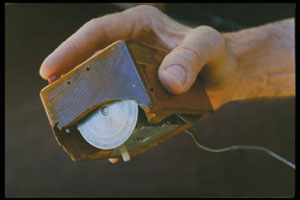While waiting in a city park to interview someone for this book, a nearby child played with Silly Putty and Legos at the same time. In my notepad I listed how many ideas the young boy, not more than five years old, came up with in 10 minutes. Sitting in the grass, he combined, modified, enhanced, tore apart, chewed on, licked, and buried various creations I'd never have imagined. His young mother, chatting on a phone while resting her morning coffee on the park bench, barely noticed the inventive creations her toddler unleashed on the world. After being chased away for making her nervous (an occupational risk of writers in parks), I wondered what happens to us, and what will happen to this boy, in adulthood. Why, as is popularly believed, do our creativity abilities decline, making ideas harder to find? Why aren't our conference rooms and board meetings as vibrant as childhood playgrounds and sandboxes? (p. 82)The passage also includes this picture of the first computer mouse with the caption, "The superficials of innovation are rarely impressive. This is a version of the first computer mouse."
. . . To open minds and find good ideas, return to the kid in the park. What is it about his attitude that allows fearless idea exploration? Linus Pauling, the only winner of two solo Nobel Prize awards in history, had this to say about finding ideas: "The best way to have a good idea is to have lots of ideas." This sounds idiotic to most ears because it cuts against the systemic, formulaic, efficiency-centric perspective worshiped in schools and professions. It seems wasteful to follow Pauling's advice. Can't we just skip to the good ideas? Optimize the process? Memorize a formula to plug stuff into? Well, you can't. (p. 85-86).
(image source: Wikipedia)
What does this have to do with Algebra? Well, this is very similar to the philosophy of what I'm asking you to do in this class. Yes, we do have some formulas that you're going to need to learn and "plug stuff into." But our more important goal is for you to open your minds and be willing to explore ideas. This is why I'm always asking you to try to figure things out, both individually and as a group, and not wait for me to tell you how to do it.
Sure, we can "skip to the good ideas" and I can just show you how to do certain procedures, but that ends up not being very meaningful for you, and you're also not very likely to remember it very long. Instead, I want you - as much as possible - to play with the ideas. To be curious, and creative, and try to figure things out and find patterns and methods on your own, including exploring various real-world applications of the mathematics. And, yes, that's harder than just memorizing the formula and doing random problems out of the book. But I think it's also much, much, much more worthy of your time.
As Eric Hoffer said,
In a time of drastic change it is the learners who inherit the future. The learned usually find themselves equipped to live in a world that no longer exists.I want you to be a learner; to take the attitude of "fearless idea exploration." In my class, in all your classes, and in life in general.

No comments:
Post a Comment